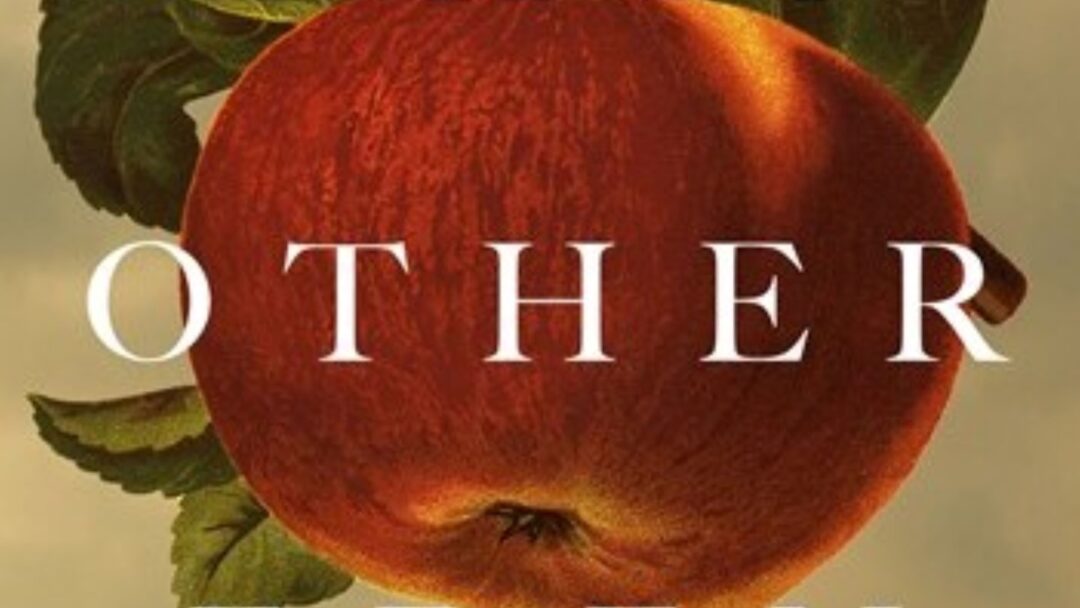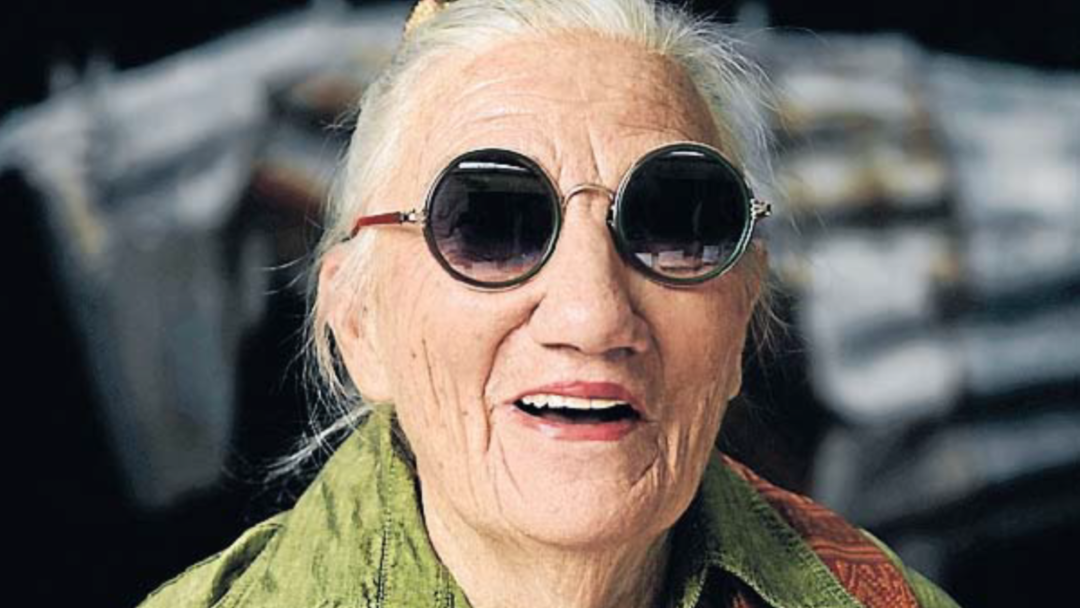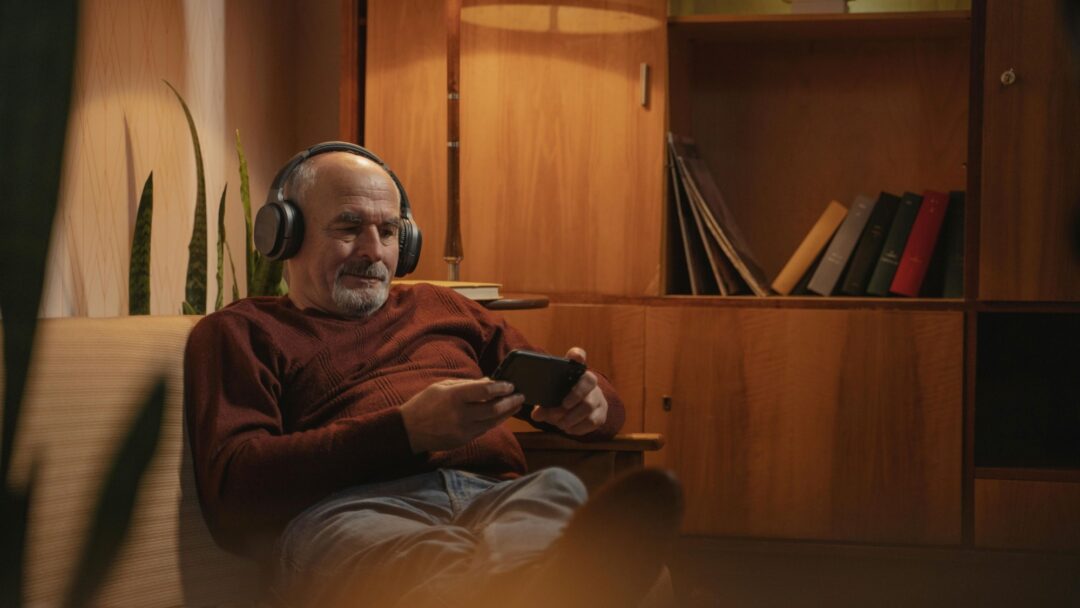Audio
Reasons Not to Worry, Wild Things... and Alan Bennett
Hear This by
Vision Australia3 seasons
9 February 2024
28 mins
New books in the Vision Australia library - from E.L.Doctorow to Alan Bennett.

Hear This is a weekly presentation from the Vision Australia Library service, for people with blindness or low vision. Host Frances Keyland brings you up to date with latest books on offer - alongside reviews and Reader Recommends.
This edition, a range of new offerings from authors ranging from E.L.Doctorow to Alan Bennett.
00:09UU
Take a look. Take a look.
00:24S1
Hello and welcome to hear this. I'm Frances Kelland and you're listening to the Vision Australia Library radio show, where we talk about books in the Vision Australia collection. Today we've got some lovely read recommended titles that I hope you enjoy. So sit back and I hope you do enjoy the whole show. A big thank you to Valerie who sent in a couple of reader recommendations. Thank you so much, Valerie. I think you called and spoke to one of their library staff, David, and they mentioned you've been an English teacher as well. So thank you so much for your recommendation. And, um, all of the people you would have taught who maybe got a love of literature from you. So the first book that you recommended that I'll mention is Reasons Not to Worry How to Be Stoic in Chaotic Times by Bridget Delaney. And it comes with a bit of a warning, because it does have themes of, I guess, exploring issues of mortality. And in this segment, Brigid talks about why she, um, started to explore, I think, how to be stoic in chaotic times.
And here's the synopsis. Reasons Not to Worry is an accessible introduction to stoic principles of virtue, moderation, and self-discipline, adapting this ancient knowledge to inspire practical advice for everyday life, we're all searching for answers to the biggest questions how to be good, how to find calm, how to properly grieve, how to beat FOMO, fear of missing out. How to work out what truly matters. Well, good news is that the wisest minds in history asked the same questions and they found answers. Their ancient philosophy of stoicism can show us that we today are, in fact, already in possession of the very tools we need to excavate this much needed wisdom for ourselves by learning and living the teachings of three ancient guides. Now, I hope I'm pronouncing these right. Epistasis Seneca and Marcus Aurelius, as Bridget, shows us how we can apply these lessons to our modern lives in a way that allows us to regain a sense of agency and tranquility. Let's hear a sample of Reasons Not to Worry How to Be Stoic in Chaotic Times. It's narrated by Blasi Best.
02:42S2
I was 29 when I was first viscerally struck by the inevitability of my own death. I had also been viscerally struck in the head. I was in the back of an ambulance covered in blood. A stranger in a strange city. Going to which hospital? I did not know. All alone, with an uncertain outcome and a great gashing gushing wound to the skull. I'd suffered a head injury after being mugged for my wallet in the back streets of Barcelona's port district, coming back from a club around 5 a.m.. Foolishly, I chased the mugger. Almost caught him when he pushed me away and into a wall that had a jagged exterior. Was it a gaudy? It felt like a gaudy. My skull took the brunt, splitting open above my right temple. There were a string of half lit dreamy moments dawn in the ambulance and racing down La Rambla in a daze, revellers going home, lurching across roads, slumped on benches and the paper stand sellers and flower stall merchants full of purpose setting up for the day ahead. What else? Soft rain on the windshield. A smear of color. Barrio Gottago. Plaza de Catalunya A fountain.
A corner turned the streets. Widening everything grey and golden and beautiful. I was full of love. I was detached. I thought that I would likely die, even though there was so much more to do with my life, and I was kind of still mostly young. Yet the certainty that I would die didn't really trouble me. I felt curiously relaxed. It was nothing personal, I understood. It was okay to die. Now I'd had a good run. I was 29, almost 30. I'd not done at all, but I'd done enough.
04:42S1
And that was reasons not to Worry by Bridget Delaney. What a wonderful title for a book. Bridget is Brigid. Brigid Delaney is d e l a n e d e l a n e. And that book goes for about 8.5 hours of just thinking about the narrator's name. Blazey Best. What a great name. Blazey Best. And we have another book by Bridget Delaney in the collection. It's called, well, Mania Misadventures in the search for wellness. So that's another book that comes under mindfulness and self-help. And she writes in this one cold pressed juices, hot yoga, quitting sugar, paleo mindfulness. If you embrace these things, you'll be happy. You'll be well. Just ask Instagram. From celebrity vegan chefs to self sleep gurus, there is no shortage of people trying to sell us the wellness dream. Wellness has become $1 billion industry, but what does wellness even mean? Feeling exhausted and a bit stressed out and flabby, journalist Bridget Delaney decides to find out, using herself as the guinea pig.
So there is another book by Bridget Delaney. Brigid Delaney was a columnist for Guardian Australia, and she has previously worked as a lawyer and journalist at the Sydney Morning Herald, The Telegraph in London and CNN, and she is the author of those books, also another book that she has written called Wild Things, and I'm on the Sydney Writers Festival website, and they've written here that Delaney has written four books and is the co-creator, along with Benjamin Law, of the Netflix series Will mania, based on on the well-meaning book. The second book that Valerie recommended is The Boys in the boat, and this is by Daniel James Brown, cast aside by his family at an early age, abandoned and left to fend for himself in the woods of Washington state, young Joe Rantz turns to rowing as a way of escaping his past.
What follows is an extraordinary journey, as Joe and eight other working class boys exchange the sweat and dust of life in 1930s America for the promise of glory at the heart of Hitler's Berlin. Stroke by stroke, remarkable young man strives to regain his shattered self-regard, to dare again, to trust in others and to find his way back home. Told against the backdrop of the Great Depression, Daniel James Brown's The Boys in the boat is narrative nonfiction of The First Order, a personal story full of lyricism and unexpected beauty that rises above the grand sweep of history and captures instead the purest essence of what it means to be alive.
Let's hear a sample of The Boys in the Boat by Daniel James Brown. It's narrated by Edward Herman.
07:37S3
Having rowed myself since the tender age of 12, and having been around rowing ever since, I believe I can speak authoritatively on what we may call the unseen values of rowing the social, moral and spiritual values of this oldest of chronicled sports in the world. No didactic teaching will place these values in a young man's soul. He has to get them by his own observation and lessons. George Yeoman. Pocock. Monday, October 9th, 1933, began as a gray day in Seattle. A gray day in a gray time. Along the waterfront. Seaplanes from the Gorst Air Transport Company rose slowly from the surface of Puget Sound and droned westward, flying low under the cloud cover, beginning their short hops over the naval shipyard at Bremerton. Fairies crawled away from Coleman Dock on water as flat and dull as Old Pewter. Downtown, the Smith Tower pointed like an upraised finger toward somber skies.
On the streets below the tower, men in fraying suit coats, worn out shoes and battered felt fedoras wheeled wooden carts toward the street corners where they would spend the day selling apples and oranges and packages of gum for a few pennies apiece around the corner on the steep incline of Wessler Way, Seattle's old original skid row, more men stood in long lines, heads bent regarding the wet sidewalks and talking softly among themselves as they waited for the soup kitchens to open. Trucks from the Seattle Post-Intelligencer rattled along cobblestone streets, dropping off bundles of newspapers. Newsboys in woolen caps lugged the bundles to busy intersections, to trolley stops and to hotel entrances, where they held the papers aloft hawking them for $0.02 a copy, shouting out the day's headline 15 million to get us relief. A few blocks south of Wessler, in a shantytown sprawling along the edge of Elliot Bay, children awoke in damp cardboard boxes that served as beds.
09:42S1
So that was the boys in the Boat by Daniel James Brown. Daniel is spelled Danielle, Danielle, James, jammies, jammies and Brown broken. That book goes for 14 hours, 14.5 hours, actually, and it comes under the category of biographies and memoirs and nonfiction and also sports. And it sounds like a very rich read. Daniel James Brown was born in 1951, and he's an author of narrative nonfiction books such as this one. And he really does take on a lot of, um, very rich sort of topics. Um, there's another book here called The Great Hinckley Fire, which burned an area of up to 250,000 acres in Minnesota. The fire killed hundreds. That was back in 1894. So he wrote a book. It was actually called Under a Flaming Sky. And one of the victims of that awful fire was his great grandfather. So he, um, tackled that book. That was his first book. But he also has written another book called The Indifferent Stars Above the Harrowing Saga of a Donner Party Bride, published in 2009. And it's the story of, um, one of the survivors of the ill fated Donner Party members who attempted to hike out of the Sierra Nevada to save herself.
The Boys in the Boat was his third book. This was published in 2013, and it looks like it's going to be made into a movie directed by George Clooney, The Boys in the boat, one of those writers that seems to be quite well known in America, but lesser known here. And thank you, Valerie, for bringing both those books. Bridget Delaney's book and Daniel James Brown to our book table today. Really interesting books. Thank you. And now on to t Craig Henson. Boyle's book, The Women. Taliesin is the home of the celebrated architect Frank Lloyd Wright. His messy private life is a considerable source of interest and scandal, along with his massive artistic achievements. His first wife, Kitty, lives in a world of her own, persuading herself that his other amours are transitory. Then there is his mistress, the passionate and strong willed mama, and there is his deranged second wife, Miriam. And if this weren't enough of a powder keg, also stirred into the heady brew is O'Sullivan, a Serbian immigrant who shares most closely the turbulence and terror of the architect's jumbled private life. Let's hear a sample of the women by Tea Corrugation Boyle. It's narrated by Michael Fitzpatrick.
12:30S4
I didn't know much about automobiles at the time. Still don't for that matter. But it was an automobile that took me to Taliesin in the fall of 1932, through a country alternately fortified with trees and rolled out like a carpet to the back wall of its barns, hay ricks and farmhouses, through towns with names like Black Earth, Mesa and Coon Rock, where no one in living memory had ever seen a Japanese face or a Chinese either stop for fuel, a sandwich, a chance to use the washroom, and you'd think a man had come down from Mars and propped himself up on the seat of a perfectly ordinary canary yellow and pit of hell black Stutz Bearcat roadster. And what is a bearcat, anyway? Some hybrid monster out of an ad man's inventory, I suppose. A thing to roar and pour and dig at the roadway.
And so this one did as advertised. Mostly along that route on a day two hot for October and two still to clear, as if the season would never change. People just stared until they caught themselves and looked away as if what they'd seen hadn't registered, not even as a fleeting image on the retina, but one man. And I won't take him to task here because he didn't know any better, and I was used to it by then. Responded to my request for a hamburger sandwich by dropping his jaw, foot, and a half and exclaiming, well, Jesus Christ, you're a Chinaman, ain't ya? The whole business was complicated by the fact that the rag top didn't seem to want to go up so that my face was exposed not only to the glare of the sun and a withering cannonade of dust, chicken feathers and pulverised dung, but to the stares of every stolid Wisconsinites I passed along the way.
14:20S1
That was the women by tea corrugation, Boyle. So the author's name is just first initial tea r then core Exxon c o r a g h e s a n c o r a g h e s n r and boil b o l e. And there are a few other books by this author in the collection there's the Tortilla Curtain, The Wild Child, and Other Stories. So a collection of short stories. Sometimes he's known simply as t c boil. Um, so the core, I guess, I guess in part is left out. There's also The Harder they come. The author was born in 1948, and he's published more than 19 novels and more than 150 short stories. He won the Pen Faulkner Award in 1988, and his original name was Thomas John Boyle, but he changed his middle name to corrugation after an ancestor of his mother. Many of Boyle's novels I'm reading from Wikipedia here.
Many of Boyle's novels and short stories explore the baby boom generation, its appetites, joys and addictions, but his larger themes are centered on the misguided efforts of the male hero and the slick appeal of the anti-hero, and they appear alongside brutal satire, humor and magical realism. Boyle has said Gabriel Garcia marquez is his favorite novelist, and he's also a fan of Flannery O'Connor and the list of awards that he has received and the awards that he's been nominated for is tremendous. Goes on and on and on. And yes, another one of those well respected American writers that we don't know as much about here. So that was the women. One of the authors that I absolutely love. And all of these books have reminded me, E.L. Doctorow. And I'm going to play a sample of his book Ragtime An Extraordinary Tapestry.
Ragtime captures the spirit of America in the era between the turn of the century and the First World War. The story opens in 1906 New Rochelle, New York, at the home of an affluent American family. One lazy Sunday afternoon, the famous escape artist Harry Houdini swerves his car into a telephone pole outside their house, and, almost magically, the line between fantasy and historical fact, between real and imaginary characters disappears. Henry Ford, Emma Goldman, J.P. Morgan, Evelyn Nesbit, Sigmund Freud and Emiliano Zapata slip in and out of the tale, crossing paths with Doctorow's imagined family and other fictional characters, including an immigrant peddler and a ragtime musician from Harlem whose insistence on a point of justice drives him to revolutionary violence. Let's hear a sample of ragtime by E.L. Doctorow. It's narrated by Peter America.
17:14S5
Most of the immigrants came from Italy and Eastern Europe. They were taken in launches to Ellis Island, there, in a curiously ornate human warehouse of red brick and gray stone. They were tagged, given showers, and arranged on benches in waiting pens. They were immediately sensitive to the enormous power of the immigration officials. These officials change names they couldn't pronounce and tore people from their families, consigning to a return voyage. Old folks, people with bad eyes, riff raff, and also those who looked insolent. Such power was dazzling. The immigrants were reminded of home. They went into the streets and were somehow absorbed in the tenements. They were despised by New Yorkers. They were filthy and illiterate. They stank of fish and garlic. They had running sores. They had no honor and worked for next to nothing. They stole, they drank, they raped their own daughters. They killed each other casually.
Among those who despised them the most were the second generation Irish. Whose fathers had been guilty of the same crimes. Irish kids pulled the beards of old Jews and knocked them down. They upended the pushcarts of Italian peddlers every season of the year. Wagons came through the streets and picked up bodies of derelicts. Late at night, old ladies and babushkas came to the morgue looking for their husbands and sons. The corpses lay on tables of galvanized iron. From the bottom of each table. A drainpipe extended to the floor. Around the rim of the table was a culvert, and into the culvert ran. The water sprayed constantly over each body from an overhead faucet.
19:14S1
And that was ragtime by E.L. Doctorow. So the first two initials are E L, so E then L. Doctorow is spelled [spells it]. And I remember this book because it was recommended to me and he was an author I knew nothing about, and someone said, oh, it's a lovely book you should read. It just goes to show the power of a recommendation, because the book has always stuck in my mind as such a surprise. There are other books by E.L. Doctorow in the library collection Worlds Fair, Andrews, brain, Homer and Langley. Edgar Lawrence Doctorow was born in 1931. He was an editor and professor. Ragtime was published in 1975. His award winning novels of all of his 12 were ragtime, Billy Bathgate in 1989 and The March in 2005. All of his works placed fictional characters in recognisable historical contexts with known historical figures, and he's been praised for his audacity and imagination. Ragtime was not only a movie made in 1981, but it was a Broadway musical of the same name, and in 1998 it won four Tony Awards.
Sadly, he has passed away, and at the time of his death, President Barack Obama called him one of America's greatest novelists. I am a fan myself. So that is E.L. Doctorow, and his book ragtime now does something completely different or another area of literature. This is an autobiography or essays and memoir by Alan Bennett. It's called Untold Stories. This book provides a collection of prose. The title piece is a poignant family memoir with an account of the marriage of the author's parents, the lives and deaths of his aunts, and the uncovering of a long held family secret. Also included are his diaries from 1996 to 2004, as well as essays, reviews, lectures and reminiscences ranging from childhood trips to the local cinema and a tour around Leeds City Art Gallery to reflections on writing. Honors. And his Westminster Abbey eulogy for English actor Thora Hird. Let's hear a sample of Untold Stories by Alan Bennett. It's narrated by Christopher Scott.
21:38S5
There was a would.
21:40S6
The canal, the river and above the river, the railway and the road. It's the first proper country that you get to as you come north out of Leeds and going home on the train. I pass the place quite often, only these days. I look. I've been passing the place for years without looking, because I didn't know it was a place that anything had happened there to make it a place, let alone a place that had something to do with me. Below the wood. The water is deep and dark, and sometimes there's a boy fishing or a couple walking a dog. I suppose it's a beauty spot now. It probably was then. Has there been any other mental illness in your family? Mr. Parr's pen hovers over the yes no box on the form, and my father, who is letting me answer the questions, looks down at his trilby and says nothing. No, I say confidently, and dad turns the trilby in his hands.
Anyway, says Mr. PA kindly. But with what the three of us know is more tact than truth. Depression isn't really mental illness. I see it all the time. Mr. Parr sees it all the time because he is the mental health welfare officer for the Craven district. And late this September evening in 1966, dad and I are sitting in his bare, linoleum floored office above Seattle Police station while he takes a history of my mother. So there's never been anything like this before? No, I say, and without doubt or hesitation. After all, I'm the educated one in the family. I've been to Oxford. If there had been anything like this, I should have known about it. No, there's never been anything like this. Well, dad says, and the information is meant for me as much as for Mr. Power. She did have something once. Just before we were married. And he looks at me apologetically. Only it was nerves more. It wasn't like this.
23:46S1
And that was Untold Stories by Alan Bennett. Alan is spelt [spells it]. Bennett is [spells it]. That book is a long one. It's got a lot of wonderful work in it. It's 24 hours and 20 minutes long. And Alan Bennett has reached that age and and girth of work, where he can be regarded as a living treasure, I guess. And there are a couple of other books, written by him in the collection. There is Writing Home, and that's his diaries from 1980 to 1990 and his thoughts on other literary figures, including John Osborne, W.H. Auden and Philip Larkin. And it also includes and this may click with some people, the story of Mary Shepherd, a homeless tramp who took up residence in his garden and stayed for 15 years. And that was made into a movie, and I think a separate book as well. It's called The Lady in the Van.
In the movie. I know Maggie Smith stars as the eponymous lady, and there is another book by him called A Life Like Other Peoples in which, in which he tells with great wit and measured sentimentality the story of his parents and maternal aunts. But I think that is in the book Untold Stories as well. It's one of the works in there. Alan Bennett was born in 1934. He's a playwright, author, actor and screenwriter, and he's received numerous awards and honors, including two BAFTA Awards for Laurence Olivier Awards and two Tony Awards. And he's earned an Academy Award nomination for his film The Madness of King George from 1994. In his earlier career, in 1960, he worked alongside Dudley Moore, Jonathan Miller and Peter Cook on the satirical revue Beyond the Fringe, and since the death of Jonathan Miller in 2019, he's become the only surviving member of the original Beyond the Fringe quartet, and there was a program on the ABC TV that ran for quite a while. It was called Talking Heads, which he wrote, which is simply people like the wonderful Patricia Patricia Rutledge talking at the camera in a character that he had created and written the entire script for. And that was a very entertaining series.
I'm a great admirer of Alan Bennett. Thank you for joining us today on Hear This. Thank you, Valerie, for your recommendations there. And thank you for also reminding me of the power of a recommendation from somebody. And how can I take you by surprise and start you off on a thread of exploring, um, different things? I was very much an English literature type of person, so American literature, I remember, was not something that I was drawn to. And ragtime changed that years ago. So a recommendation can open up a whole field of unexplored works of somebody, or a type of fiction or even a geographical location. I love reader recommendation. So please, if anybody has some, send them through. You never know what you'll open up for people. If you would like to join the library as well. The number is one 306 54656. That's 1300 654 656. Or you can email library at Vision Australia - org.... library@visionaustralia.org.
Whichever way you contact the library, you can ask them any questions about the books, the catalogue. You can put forward suggestions for what you would like to see in the library. eBooks that have been around for a while and they're not in the collection. You know you can suggest them. It's always welcome. The library is community driven by its members, so the collection is shaped by its users. I hope you all have a lovely week and we'll be back next week with more Hear This.
Continue listening

On Hear This, latest books in the Vision Australia library. This edition, award-winning Oz fiction.
Australian fiction
Hear This by Vision Australia
4/8/2023
•28 mins
Audio

Books from the Vision Australia library - this episode featuring memoirs and family histories.
Family histories
Hear This by Vision Australia
11/8/2023
•27 mins
Audio

This edition: Michael Parkinson remembered and an assortment of latest books from the Vision Australia library.
Vale Michael Parkinson
Hear This by Vision Australia
18/8/2023
•26 mins
Audio

Hear This reviews latest books from Vision Australia library - this edition starting with two Booker Prize aspirants.
Booker Prize hopefuls
Hear This by Vision Australia
25/8/2023
•27 mins
Audio

Hear This interviews Tracey Chevalier, author of Girl with a Pearl Earring.
Girl with a Pearl Earring
Hear This by Vision Australia
8/9/2023
•28 mins
Audio

Hear This samples a variety of audio books from the Vision Australia library.
Top picks from audio books
Hear This by Vision Australia
15/9/2023
•28 mins
Audio

Events and activities at Vision Australia library - and latest picks from its books.
Community engagement
Hear This by Vision Australia
22/9/2023
•27 mins
Audio

This edition of Hear This from the Vision Australia library opens with a discussion of banned books.
Banned books
Hear This by Vision Australia
6/10/2023
•28 mins
Audio

Hear This features latest books and events at the Vision Australia library.
Latest events and books
Hear This by Vision Australia
13/10/2023
•27 mins
Audio

Latest books from the Vision Australia library - including childhood tales and a John Grisham thriller.
Childhood tales and a Grisham thriller
Hear This by Vision Australia
20/10/2023
•28 mins
Audio

Latest books from the Vision Australia library - including a novel by Australian Sam Drummond.
Oz writer Sam Drummond
Hear This by Vision Australia
3/11/2023
•27 mins
Audio

Books from the Vision Australia library - including a memoir by a friend of Anne Frank.
Anne Frank's friend
Hear This by Vision Australia
10/11/2023
•28 mins
Audio

Book reviews and excerpts from Vision Australia library - including a wartime struggle for survival.
Survival in wartime
Hear This by Vision Australia
24 November 2023
•27 mins
Audio

A special seasonal edition reviews Christmas murder stories available from Vision Australia library.
Yuletide Homicide
Hear This by Vision Australia
8 December 2023
•28 mins
Audio

Veteran talking book reader Tony Porter reviews his many voices.
The many voices of Tony Porter
Hear This by Vision Australia
5 January 2024
•27 mins
Audio

What's new in Vision Australia library of Braille and audio books - including new Australian works.
New Australian books
Hear This by Vision Australia
12 January 2024
•28 mins
Audio

Vision Australia librarian talks of coming events and latest books for people with blindness and low vision.
Coming events and new books
Hear This by Vision Australia
26 January 2024
•28 mins
Audio

Review of books from the Vision Australia library - from a broad international range.
Books from Japan, US, Australia and Sweden
Hear This by Vision Australia
2 February 2024
•27 mins
Audio

New books in the Vision Australia library - from E.L.Doctorow to Alan Bennett.
Reasons Not to Worry, Wild Things... and Alan Bennett
Hear This by Vision Australia
9 February 2024
•28 mins
Audio

Latest events and books from Vision Australia Library, featuring its Community Engagement Co-ordinator.
Vision Library latest with Leeanne
Hear This by Vision Australia
16 February 2024
•28 mins
Audio

Features Jamie Kelly of Vision Australia Library, updating us on its website catalogue. And other new books.
Vision Australia library online, and Jelena Dokic
Hear This by Vision Australia
23 February 2024
•29 mins
Audio

New books in the Vision Australia Library - in this edition, books about paintings.
Books about paintings
Hear This by Vision Australia
1 March 2024
•26 mins
Audio

From the Vision Australia Library, women's memoirs on International Women's Day.
Women's memoirs on IWD
Hear This by Vision Australia
8 March 2024
•28 mins
Audio

Coming events and books at Vision Australia Library for people with blindness or low vision.
Coming events at Vision Library - and a Kerouac classic
Hear This by Vision Australia
15 March 2024
•29 mins
Audio

Latest books from Vision Australia Library - this week, some top Oz and worldwide novels.
Top Oz and world novels
Hear This by Vision Australia
29 March 2024
Audio

Coming events at Vision Australia Library in connection with the Melbourne Writers' Festival.
Melbourne Writers' Festival
Hear This by Vision Australia
5 April 2024
•28 mins
Audio

Coming events and new books at the Vision Australia Library for blind and low vision people.
Event update and more new books
Hear This by Vision Australia
12 April 2024
•29 mins
Audio

How printed works are brought to life as audio books in the Vision Australia Library.
Audio book narrators
Hear This by Vision Australia
19 April 2024
•28 mins
Audio

ANZAC Day edition of this series from the Vision Australia library for people with blindness or low vision.
ANZAC sniper
Hear This by Vision Australia
26 April 2024
•28 mins
Audio

From the Vision Australia library: a South African childhood, AI issues and an American First Lady.
Apartheid, AI and Michelle Obama
Hear This by Vision Australia
3 May 2024
•27 mins
Audio

Forthcoming Vision Library events including those connected with the Melbourne Writers' Festival.
Melbourne Writers' Festival and Vision Library events
Hear This by Vision Australia
10 May 2024
•28 mins
Audio

Murder mystery novels available from the Vision Australia library are reviewed and sampled.
Murder mysteries
Hear This by Vision Australia
24 May 2024
•27 mins
Audio

Celebrating National Reconciliation Week with books from Vision Australia Library... plus some user favourites.
Reconciliation Week and Reader Recommends
Hear This by Vision Australia
31 May 2024
•27 mins
Audio

Reader Recommends and crime fiction from the Vision Australia library for blind and low vision people.
This Other Eden... and some other readin'!
Hear This by Vision Australia
7 June 2024
•29 mins
Audio

Vision Library's coming community events and latest books for people with blindness or low vision.
Coming events and latest books
Hear This by Vision Australia
14 June 2024
•29 mins
Audio

Books in Vision Australia library for people with impaired vision - this time on the theme of Darkness.
Darkness
Hear This by Vision Australia
21 June 2024
•29 mins
Audio

New books in Vision Library including the Wikileaks founder's autobiography.
Julian Assange - by the man himself
Hear This by Vision Australia
28 June 2024
•29 mins
Audio

Community events soon to happen at Vision Australia Library for people with blindness and low vision.
Coming events at Vision Australia Library
Hear This by Vision Australia
5 July 2024
•28 mins
Audio

Two well-known authors open the latest look at new publications in the Vision Australia Library.
Hilary Mantel, Bret Easton Ellis and more
Hear This by Vision Australia
19 July 2024
•27 mins
Audio

Vision Library series, this episode features new Australian crime novels written by women.
Australian sisters in crime
Hear This by Vision Australia
26 July 2024
•28 mins
Audio

Latest publications in the Vision Library, starting with a biography of John Farnham.
He's the Voice
Hear This by Vision Australia
2 August 2024
•27 mins
Audio

Latest reviews and readings from publications in the Vision Library for people with print disabilities.
Race, history and Black Ducks
Hear This by Vision Australia
9 August
•28 mins
Audio

Books from Vision Library reviewed include a Julie Andrews memoir, Guardian newspaper picks and more.
Julie remembers and The Guardian recommends
Hear This by Vision Australia
30 August 2024
•27 mins
Audio

An Australian author discusses her works, plus reviews of other books in the Vision Library.
Jane Rawson - author
Hear This by Vision Australia
6 September 2024
•28 mins
Audio

Update on forthcoming events and available publications at the Vision Australia Library.
What's On at Vision Australia Library
Hear This by Vision Australia
13 September 2024
•27 mins
Audio

Accessible Vision Library books reviewed, including murder mysteries and award nominees.
Mysteries and prize contenders
Hear This by Vision Australia
20 September
•27 mins
Audio

Reviews and events at Vision Australia Library to mark World Sight Day, October 10.
World Sight Day and Barbra Streisand
Hear This by Vision Australia
4 October 2024
•28 mins
Audio

What's on in the Vision Library, and the works of Ira Levin and Han Kang.
Library events, Ira Levin and Han Kang
Hear This by Vision Australia
11 October 2024
•28 mins
Audio

Vision Library publications reviewed - opening with some tributes to writers passed.
Tributes, and more
Hear This by Vision Australia
18 October 2024
•28 mins
Audio

Reviews and readings from Australian, British and US books in the Vision Australia Library.
Tomorrow, Questions, Mistresses and Murder
Hear This by Vision Australia
25 October 2024
•28 mins
Audio

Reviews and readings from books available in the Vision Australia Library.
From Australian thrillers to the US and South Africa
Hear This by Vision Australia
1 November 2024
•28 mins
Audio

A wide range of books in the Vision Australia Library are reviewed and sampled.
Leonard Cohen, ghosts and Broken Hill
Hear This by Vision Australia
8 November 2024
•28 mins
Audio

Events and publications at Vision Australia Library for people with blindness or low vision.
Vision Library: what's in and what's on
Hear This by Vision Australia
15 November 2024
•28 mins
Audio

Interview with an award-winning author about her life and work... plus more publications in the Vision Australia Library.
Jacqueline Bublitz
Hear This by Vision Australia
22 November 2024
•28 mins
Audio

Vision Australia Library for people with vision impairment updates its coming events and latest publications.
Coming soon to the Vision Library
Hear This by Vision Australia
13 December 2024
•28 mins
Audio

Christmas-themed books in the Vision Australia Library for people with vision impairment.
Christmas offerings
Hear This by Vision Australia
20 December 2024
•28 mins
Audio

New books for 2025, fiction and non-fiction - vale Leunig!
Fiction and non-fiction for the New Year
Hear This by Vision Australia
3 January 2025
•27 mins
Audio

Reviews of varied books from the Vision Library - some centring on radio stations or radio plays.
Radio drama
Hear This by Vision Australia
10 January 2025
•29 mins
Audio

What's On at Vision Australia Library - and latest publications accessible to people with blindness and low vision.
Coming events in 2025 - and latest publications
Hear This by Vision Australia
24 January 2025
•28 mins
Audio

Writings on Marianne Faithfull and award-contending works in the Vision Australia Library are reviewed.
Vale Marianne... and award-nominated books
Hear This by Vision Australia
31 January 2025
•28 mins
Audio

Special guest highlights interesting events in libraries around the country... and some new books.
What's new in libraries around Australia
Hear This by Vision Australia
7 February 2025
•27 mins
Audio

Accessible publications chosen for February 14: Library Lovers' Day, Valentines Day and World Radio Day.
Library Lovers' Day
Hear This by Vision Australia
14 February 2025
•29 mins
Audio

An update on Vision Australia Library's coming events and latest blind-accessible books.
Coming events and new books
Hear This by Vision Australia
25 February 2025
•29 mins
Audio

Reviews of accessible books including a John Steinbeck classic, and news of a forthcoming writers' festival.
Brimbank and Steinbeck
Hear This by Vision Australia
28 February 2025
•29 mins
Audio

Coming courses and other events at Vision Australia Library - and latest accessible books.
Courses, events and latest publications
Hear This by Vision Australia
14 March 2025
•28 mins
Audio

Special with interviews and readings at a writers' festival and writing competition in Melbourne.
Brimbank Writers' and Readers' Festival and Micro-fiction Competition
Hear This by Vision Australia
21 March 2025
•30 mins
Audio

An interview with an Australian woman writer and reviewer, about her favourite female authors.
Women authors with Stella Glorie
Hear This by Vision Australia
28 March 2025
•29 mins
Audio

Reviews and excerpts from accessible works in the Vision Australia Library, starting with a new Australian novel.
Reader recommends a Deal
Hear This by Vision Australia
4 April 2025
•27 mins
Audio

Vision Australia Library brings news of accessible events at the forthcoming Melbourne Writers' Festival.
Melbourne Writers' Festival 2025
Hear This by
11 April 2025
Audio

Vision Australia Library pays tribute to the late Australian author of the Miss Fisher mysteries and more.
Vale Kerry Greenwood
Hear This by Vision Australia
18 April 2025
•28 mins
Audio

ANZAC Day special featuring reviews and short readings from books about the First World War.
Reading about World War 1
Hear This by Vision Australia
25 April 2025
•28 mins
Audio

Reviews and readings of user favourites in Vision Library - including an Antarctic adventure.
Reader recommended
Hear This by Vision Australia
2 May 2025
•28 mins
Audio

What's accessible in the Vision Australia Library - including new books by Kate Grenville and Eric Idle.
Always look on the bright side of... time and place
Hear This by Vision Australia
9 May 2025
•29 mins
Audio

First part of an interview with an Australian author, military historian and war veteran.
Barry Heard's true tales of war (part 1)
Hear This by Vision Australia
16 May 2025
•28 mins
Audio